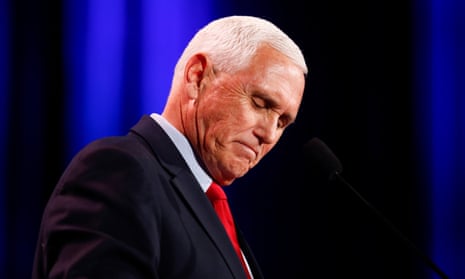Close aides to Mike Pence discovered about a dozen classified-marked documents stored in boxes at his home in Indiana last week and turned over the materials to the US justice department, according to a top adviser to the former vice-president.
The documents were inadvertently taken to Pence’s home at the end of the Donald Trump administration and Pence was unaware of their presence, his representative to the National Archives and former counsel Greg Jacob said in a letter.
The presence of sensitive papers in Pence’s home, weeks after similar discoveries at Biden’s properties and after the FBI seized hundreds of classified-marked documents from Donald Trump, also raises more questions about the management of sensitive government records.
Special counsels have been appointed to investigate Biden and Trump over the retention of such documents.
Jacob said in the letter, dated 18 January and first reported by CNN, that Pence hired an outside lawyer to search his home out of an abundance of caution after the discovery of classified-marked documents at Biden’s residence and a private office in Washington.
The letter added that the lawyer could not specify anything more about the documents – including the content, dates and classification level, which remain unclear – because he stopped looking as soon he saw the classified markings.
“On Monday, 16 January, Vice-President Pence engaged outside counsel, with experience in handling classified documents, to review records stored in his personal home,” Jacob wrote. “Counsel identified a small number of documents that could potentially contain sensitive or classified information.”
Jacob notified the National Archives and the agency immediately alerted the justice department’s national security division, which took possession of the documents and is understood to have launched a review into the matter.
The discovery of classified-marked documents is an embarrassing development for Pence after he confidently told ABC News last year that he had not improperly removed any materials from the White House. “I did not,” Pence said in November last year.
Trump – Pence’s former boss – has been under federal investigation for more than a year over whether he wilfully retained national security documents at his Mar-a-Lago resort after the end of his presidency, and whether he obstructed efforts by the justice department to secure their return starting in May last year.
Compared to Biden and now Pence, who moved quickly to return documents to the government, Trump’s resistance to handing over materials at his Florida property led to the justice department turning his case into a criminal investigation.
The department has typically pursued cases of mishandled classified documents criminally when they involve aggravating factors: wilful mishandling of classified information, vast quantities of materials to suggest misconduct, disloyalty to the United States and obstruction.
The investigation into Trump touches on at least two of those elements – obstruction, where a person conceals documents with an intent to impede a government agency, and the volume of classified materials at Mar-a-Lago.
The obstruction applies particularly to Trump because of his repeated refusal to fully surrender classified documents, including when he only partially complied with a grand jury subpoena issued in May demanding any classified materials.
For months, Trump also resisted conducting a search for any classified documents that the justice department suspected were still in his possession even after the FBI searched Mar-a-Lago, only for an eventual search in December to turn up two additional documents.
